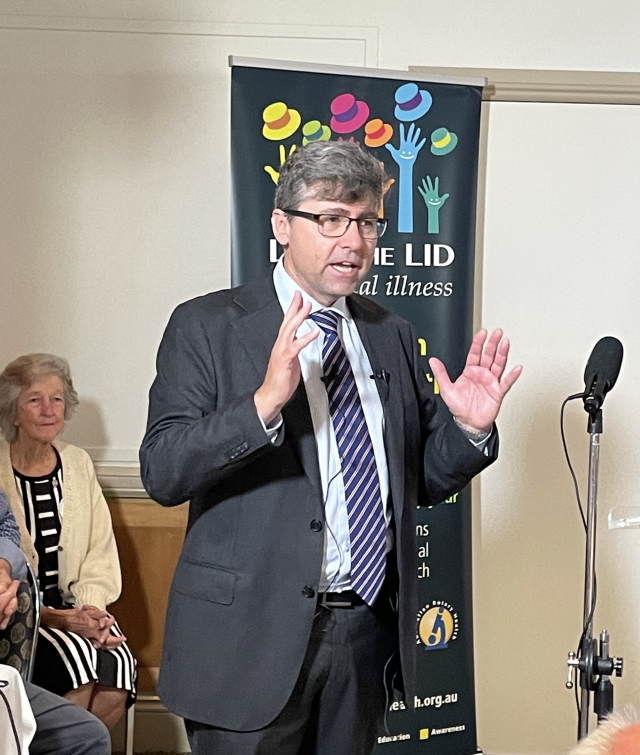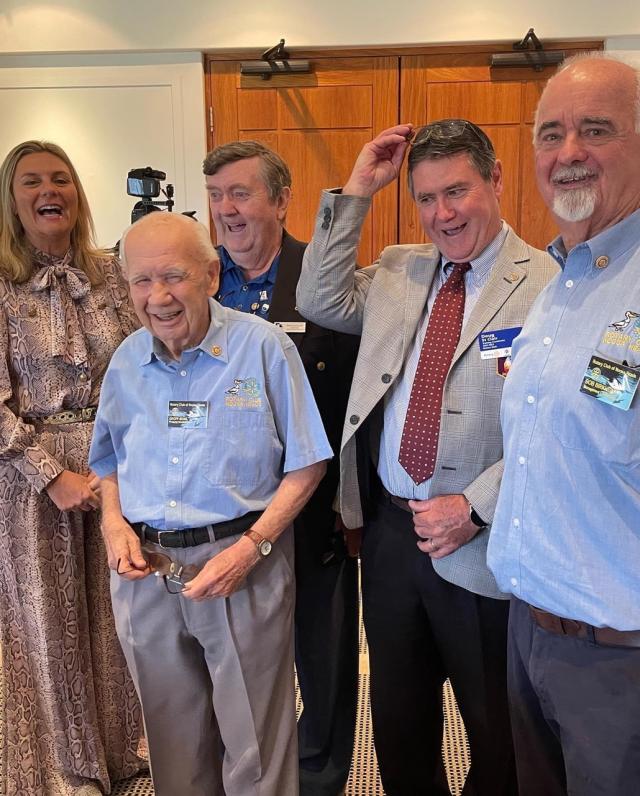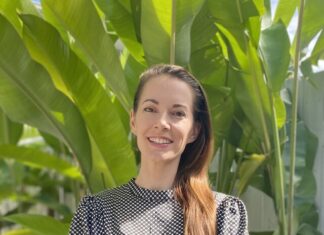Over 60 people attended the Don’t Bottle it Up Conference at Noosa Springs Resort on Wednesday 5 October.
This event was part of the Rotarians 4 Mental Health campaign conducted by the Rotary Clubs of Cooroy, Eumundi, Noosa, Noosa Daybreak and Noosa Heads aimed at encouraging people impacted by mental health issues to seek support rather than to suffer in silence.
Noosa Mayor Clare Stewart opened the event with her ongoing commitment of support for the invaluable work being done by the five clubs in bringing the awareness and actions about the mental health issues within the Noosa Shire.
Chair of the organising committee Bob Birkhead, from the Noosa Heads club, said the event was a huge success.
“As a committee, we believe the conference has most certainly achieved what we set to do by providing up to date information about research, education, and treatment options, as well as exploring the many opportunities for people touched by mental health issues, to seek out ways to improve mental fitness.”
Director of USC’s Thompson Institute, professor Jim Lagopoulos, provided hope for guests in his summary of the latest developments in mental health research.
He discussed results of actions taken by the Thompson Institute to reduce the high levels of suicides on the Sunshine Coast, including the focus of the institute on neuroscience, and developments in the knowledge of medical practitioners about treatment options.
“We take a three-pronged approach to driving down the rate of suicide,” he said.
“The first thing is community awareness. The second prong is to create a digital platform, including an app with region specific information that can out to the people that need it fast. The third aspect of our program is to develop a medical treatment for suicidality.
“When someone has an attempt on their life, you’ve got to have a treatment to treat it. At the moment we don’t have that. When someone has an attempt on their life, they end up at the emergency department, they’ll be seen by the good doctors there, they’ll be given an anti-depressant and two days later they’ll be sent away.
“The problem with that scenario is that anti-depressants don’t work against suicide. They take between four and six weeks before they work. Some anti-depressants heighten suicidality in the first couple of days, to a week after they start. And yet that is the gold standard. After a couple of days in hospital, we discharge the patient, and statistics will show, that there is a spike in completed suicides after that.”
Jim said in 2019, the Thompson Institute ran the first trial that looked at the effectiveness of low-dose oral ketamine for the treatment of suicidality.
“69 per cent of people that came into the trial achieved a complete remission by six weeks,” he said.
“And five percent of that 69 per cent achieved complete remission in a day. That is all on the basis of 20 years of research that we did trying to understand what goes wrong in suicidality.
“Ketamine is what we call a glutamate agonist. It’s not a horse tranquilliser, it’s not a recreational drug, it’s not an anaesthetic. It results in, what I term, a scaffold or protective sheet being built around brain cells. And it stops those brain cells from dying.”
Jim also went into very sobering comments about the anticipated level of mental health issues for children up to the age of 12, with some 50 per cent expected to be impacted.
This statement was later collaborated by Kevin Shadbolt, chairman of Australian Rotary Health, who said their focus and actions on the level of mental health issues impacting young people must be a key priority of the work of Australian Rotary Health.
Kevin highlighted the important role that Australian Rotary Health has played in supporting mental health research and initiatives across Australia over the past 40 years supporting healthier minds, bodies and communities through research, awareness and education.
The conference also heard from Simon Eager, citing his own experience as a PTSD survivor from his service in the UK Police force, and how a community can rebuild resilience and connections.
Sunshine Coast Holistic Health Group founder Melanie Eager, with some 2600 members, outlined a series of self help actions that can make a difference to people impacted by anxiety and other issues, through breathing techniques and the application of havening practices.
Former Australian Test and Queensland Sheffield Shield player, Tony Dell, spoke about his PTSD affliction and journey that led to him forming Stand Tall for PTS.
The organisation, which is supported by Governor Generals, and heads of Defence Forces, focuses on the improvement in the lives of defence personnel, first responders and emergency service personnel who are affected by PTSD.
Tony added that the Productivity Commission announced in November 2020 that mental health and suicide costs Australia some $220 billion a year.
A fact supported by professor Jim Lagopoulos of the Thompson Institute, who believes that many of the current spending programs by government need to be reassessed to achieve far better mental health outcomes.
Angie Weeks of PTSD Dogs Australia, spoke about how her group was formed to assist service personnel, first responders and emergency services personnel with PTSD through the calming influences of highly trained assistance dogs.
“It costs about $40,000 to train a dog and all dogs that are part of the program are rescue dogs,” Angie said.
“It is our aim to try and help as many as we can to achieve an improved wellness and lifestyle.”
The success of the event will be discussed at a debrief meeting next week by the Rotarians 4 Mental Health committee and to look into future actions in support of the Don’t Bottle it Up campaign.
During the conference, a raffle was drawn and the lucky winner was Shannon Thomas from the ‘Healthier Mind Community’. The five Rotary Clubs of Noosa, Cooroy and Eumundi would like to thank all those who so generously supported the raffle. The proceeds will go to support PTSD Dogs and Mental Health Awareness programs in the community.










